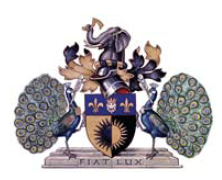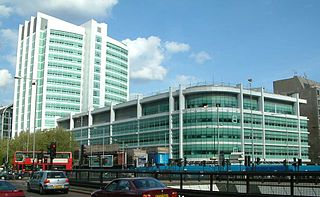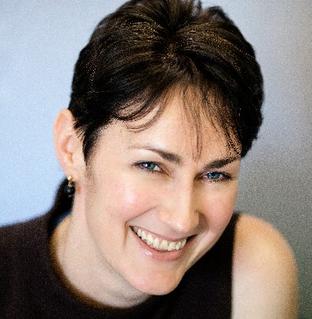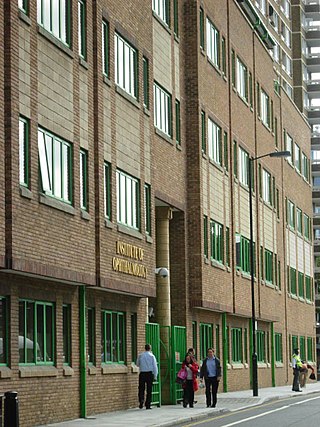
Moorfields Eye Hospital is a specialist National Health Service (NHS) eye hospital in Finsbury in the London Borough of Islington in London, England run by Moorfields Eye Hospital NHS Foundation Trust. Together with the UCL Institute of Ophthalmology, which is adjacent to the hospital, it is the oldest and largest centre for ophthalmic treatment, teaching and research in Europe.

University College Hospital (UCH) is a teaching hospital in the Fitzrovia area of the London Borough of Camden, England. The hospital, which was founded as the North London Hospital in 1834, is closely associated with University College London (UCL), whose main campus is situated next door. The hospital is part of the University College London Hospitals NHS Foundation Trust.

Whittington Hospital is a district general and teaching hospital of UCL Medical School and Middlesex University School of Health and Social Sciences. Located in Upper Holloway, it is managed by Whittington Health NHS Trust, operating as Whittington Health, an integrated care organisation providing hospital and community health services in the north London boroughs of Islington and Haringey. Its Jenner Building, a former smallpox hospital, is a Grade II listed building.

Great Ormond Street Hospital is a children's hospital located in the Bloomsbury area of the London Borough of Camden, and a part of Great Ormond Street Hospital for Children NHS Foundation Trust.

The Norfolk and Norwich University Hospital (NNUH) is a large National Health Service academic teaching hospital in the Norwich Research Park on the western outskirts of Norwich, England.

The Royal Free London NHS Foundation Trust is an NHS foundation trust based in London, United Kingdom. It comprises Royal Free Hospital, Barnet Hospital, Chase Farm Hospital, as well as clinics run by the trust at Edgware Community Hospital, Finchley Memorial Hospital, and North Middlesex University Hospital. On 1 July 2014, the Barnet and Chase Farm Hospitals NHS Trust was acquired by Royal Free London NHS Foundation Trust, making it one of the largest trusts in the country.
UCLPartners is an academic health science centre located in London, England. It is the largest academic health science centre in the world, treats more than 1.5 million patients each year, has a combined annual turnover of around £2 billion and includes around 3,500 scientists, senior researchers and consultants.
University College London Hospitals NHS Foundation Trust (UCLH) is an NHS foundation trust based in London, United Kingdom. It comprises University College Hospital, University College Hospital at Westmoreland Street, the UCH Macmillan Cancer Centre, the Royal National ENT and Eastman Dental Hospitals, the Hospital for Tropical Diseases, the National Hospital for Neurology and Neurosurgery, the Royal London Hospital for Integrated Medicine and the Royal National Throat, Nose and Ear Hospital.
Great Ormond Street is a British television documentary series. It was first broadcast on BBC Two on 6 April 2010. Each episode focuses on a different department at the Great Ormond Street Hospital for Children in London.

The UCLH Biomedical Research Centre is a biomedical research centre based in London. It is a partnership between University College London Hospitals NHS Foundation Trust (UCLH), University College London (UCL) the National Institute for Health and Care Research (NIHR) and UCLPartners. It was one of the original five Comprehensive Biomedical Research Centres established by the NIHR in April 2007.

The Royal London Hospital for Integrated Medicine is a specialist alternative medicine hospital located in London, England and a part of University College London Hospitals NHS Foundation Trust. It is the largest public sector provider of complementary medicine in Europe. It is based in the Bloomsbury area of Central London, adjacent to Great Ormond Street Hospital.

University College Hospital at Westmoreland Street, named The Heart Hospital until refurbished and renamed in 2015, was a specialist cardiac hospital located in London, United Kingdom until 2015. It is part of the University College London Hospitals NHS Foundation Trust and is closely associated with University College London (UCL). After the 2015 refurbishment, the hospital now provides thoracic surgery and urology services.
John Eric Deanfield is a British professor of cardiology and past Olympic fencer.
Barnet, Enfield and Haringey Mental Health NHS Trust (BEH) is a large provider of integrated mental health and community health services in North London, providing services across Barnet, Enfield, and Haringey. The trust currently employs around 3,000 staff and serves a population of just over a million. The annual income in 2017-18 was c. £210 million.
Kim Holt is a British paediatrician at one time employed by Great Ormond Street Hospital. She founded Patients First after the Death of Baby P scandal, in order to support whistleblowers in the National Health Service.

Maria Bitner-Glindzicz was a British medical doctor, honorary consultant in clinical genetics at Great Ormond Street Hospital, and a professor of human and molecular genetics at the UCL Institute of Child Health. The hospital described her work as relating to the "genetic causes of deafness in children and therapies that she hoped would one day restore vision." She researched Norrie disease and Usher syndrome, working with charities including Sparks and the Norrie Disease Foundation, and was one of the first colleagues involved in the 100,000 Genomes Project at Genomics England.
Russell Mardon Viner, FMedSci is an Australian-British paediatrician and policy researcher who is Chief Scientific Advisor at the Department for Education and Professor of Adolescent Health at the UCL Great Ormond Street Institute of Child Health. He is an expert on child and adolescent health in the UK and internationally. He was a member of the UK Government's Scientific Advisory Group for Emergencies (SAGE) during the COVID-19 pandemic and was President of the Royal College of Paediatrics and Child Health from 2018 to 2021. He remains clinically active, seeing young people with diabetes each week at UCL Hospitals. Viner is Vice-Chair of the NHS England Transformation Board for Children and Young People and Chair of the Stakeholder Council for the Board. He is a non-executive director (NED) at Great Ormond St. Hospital for Children NHS Foundation Trust, also sitting on the Trust's Finance & Investment and the Quality and Safety sub-committees.
Dr Noor ul Owase Jeelani BMed.Sci (Hons), BMBS, MRCS, MBA, MPhil, FRCS (NeuroSurg.) is a Kashmiri-British neurosurgeon and academic. He is a Consultant Paediatric Neurosurgeon at Great Ormond Street Hospital for Children (GOSH) and was the Head of the Department of Neurosurgery from 2012 until 2018. He is an Honorary Associate Professor at the Institute of Child Health, University College London. He leads the FaceValue research group in Craniofacial Morphometrics, device design, and clinical outcomes.











